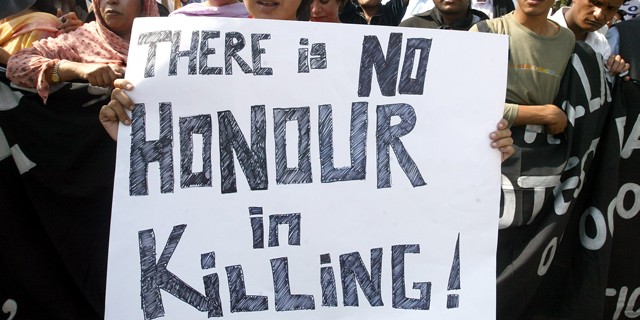

Dear All,
Is women’s situation unchanged when it comes to the question of ‘honour killings’ in Pakistan? What are the factors hindering any progress in this matter and what do women themselves have to say about it?
This was the theme of BBC Urdu’s recent special season. But before you roll your eyes and exclaim "not that again!’ or say "we are sick and tired of foreign programmes going on and on about these practices", let me tell you that the most interesting part of the series is the wide variety of women’s voices we heard over the course of the season.
The season included (along with many other components) a series of discussions in various university campuses across the county. I was fortunate enough to moderate the discussions at Peshawar University and then at one of the Swat University campuses.
The discussion in Peshawar centred around the topic of how tribal jirgas impact on women’s rights and the two panelists provided us with two completely different views. One was Malik Waris Khan Afridi, a tribal sardar, a former MNA and former federal minister, while the other was Noreen Naseer, an academic from the university’s Political Science department and herself from the tribal areas.
Since they had completely different viewpoints an animated discussion followed and we got excellent input from the student audience. The female students were particularly impressive in the way they countered the sardar’s assertions that women in the federally administered tribal areas (Fata) were accorded great respect and had an enviable position, and that the solution to everything lay in female education rather than in any sort of legal or social reform.
One student tore apart his first assertion by asking if forced marriages, child marriages and violence against tribal women equated ‘respect’ (izzat). Another told him education changed little unless society’s attitudes and thinking remained unchanged.
It was a good debate because there was a degree of thinking aloud. One male student said that change was needed but perhaps one could try and retain the traditional form of the jirga but make it more inclusive and progressive. Another insisted that everything was fine as it was because it was ‘according to religion.’
In the second debate, which was at Swat University, the topic was ‘Suicide or Murder?’. This was a reference to the fact that although the overall figures for honour killings are low in the Khyber Pakhtunkhwa province, the incidence of female suicides is high, particularly in the Swat-Chitral area.
Here, again, two excellent panelists, Saima Muneer of Aurat Foundation and PTI MPA Shaukat Yusufzai, got the debate going. After several male students gave their input, finally the female students (all of whom were wearing niqab) and faculty joined the discussion -- and they had a lot to say.
Their comments gave one a real sense of the pressures they were under, despite the fact that Swat has a higher rate of female literacy than most other areas and also a history of education which dates back to its days as an independent state.
One student raised the same point made in Peshawar: that education alone cannot effect change and that girls are still treated as inferior beings compared to all the men in their family. "What hope was there for women," she asked, "if a brother is brought up to believe that he can dominate his sisters and boss them around (or kill them) as he sees fit."
Another young woman said that although the suicide figures might be questionable, she was sure some of the women were taking their own lives because they were under constant pressure and "got no support or encouragement from their parents or families".
And when the MPA, towards the end of the discussion, flippantly declared that women were to blame for what was going on (winning a round of applause from the boys), the girls reacted and one of them stood up and responded to him indignantly.
For me it was a learning experience: meeting so many people, hearing young voices, debating the issues. Plus I was able to visit the wonderful campus that is Peshawar University (it is wonderful) and I was able to travel to Swat.
And even though we all function in the shadow and underlying threat of the religious extremism that is now part of the area’s recent history, it was a real honour to be able to discuss what is mostly a very sensitive issue -- and to hear the voices of these students.
They are powerful voices. Which is of course why their oppressors do not want them to be heard…
Best wishes